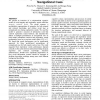Free Online Productivity Tools
i2Speak
i2Symbol
i2OCR
iTex2Img
iWeb2Print
iWeb2Shot
i2Type
iPdf2Split
iPdf2Merge
i2Bopomofo
i2Arabic
i2Style
i2Image
i2PDF
iLatex2Rtf
Sci2ools
114
click to vote
IUI
2010
ACM
2010
ACM
Facilitating exploratory search by model-based navigational cues
We present an extension of a computational cognitive model of social tagging and exploratory search called the semantic imitation model. The model assumes a probabilistic representation of semantics for both internal and external knowledge, and utilizes social tags as navigational cues during exploratory search. We used the model to generate a measure of information scent that controls exploratory search behavior, and simulated the effects of multiple presentations of navigational cues on both simple information retrieval and exploratory search performance based on a previous model called SNIF-ACT. We found that search performance can be significantly improved by these model-based presentations of navigational cues for both experts and novices. The result suggested that exploratory search performance depends critically on the match between internal knowledge (domain expertise) and external knowledge structures (folksonomies). Results have significant implications on how social informa...
Exploratory Search Behavior | Exploratory Search Performance | IUI 2010 | Navigational Cues | Software Engineering |
| Added | 17 Mar 2010 |
| Updated | 17 Mar 2010 |
| Type | Conference |
| Year | 2010 |
| Where | IUI |
| Authors | Wai-Tat Fu, Thomas George Kannampallil, Ruogu Kang |
Comments (0)

